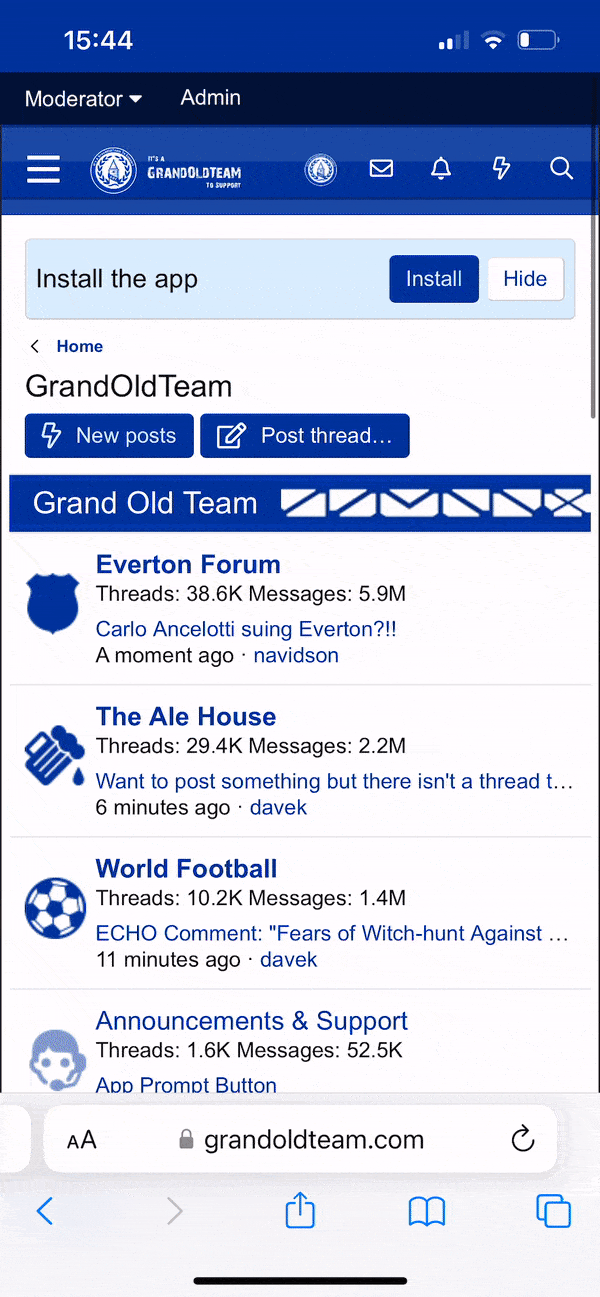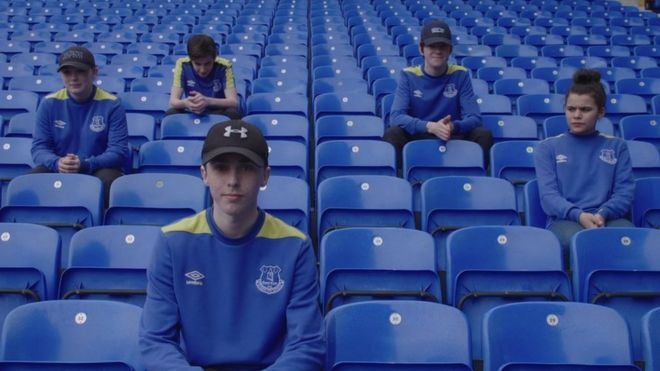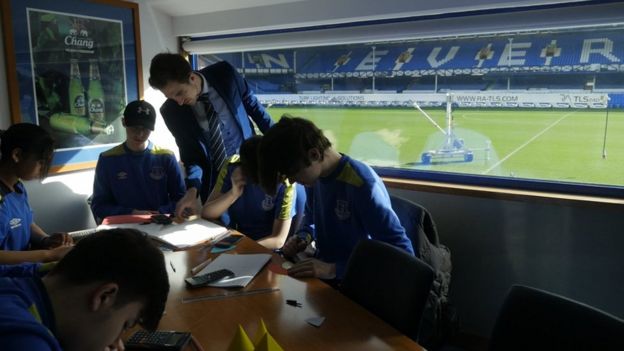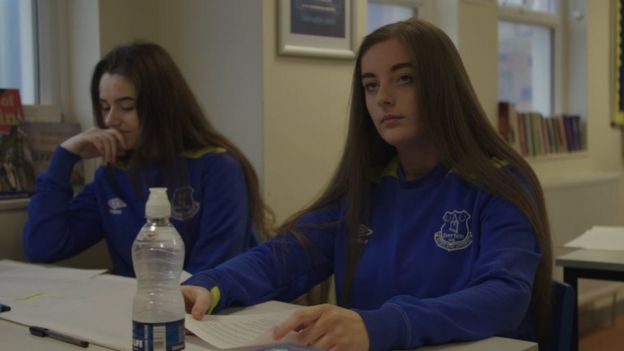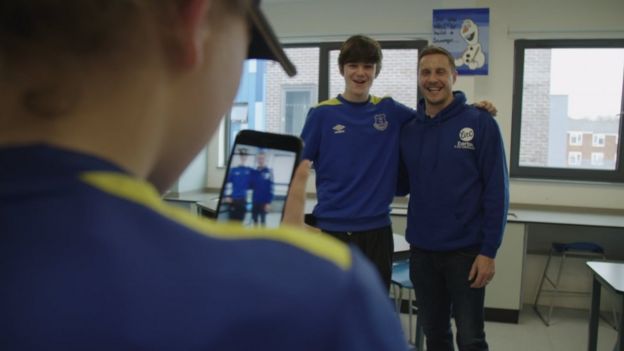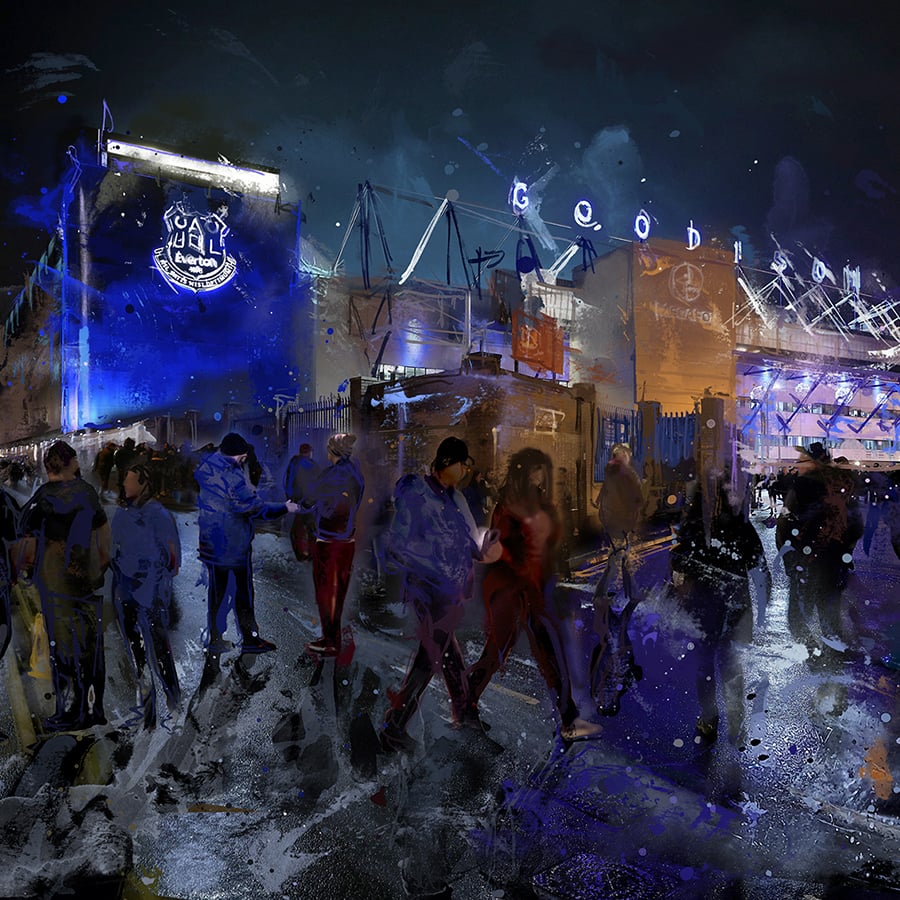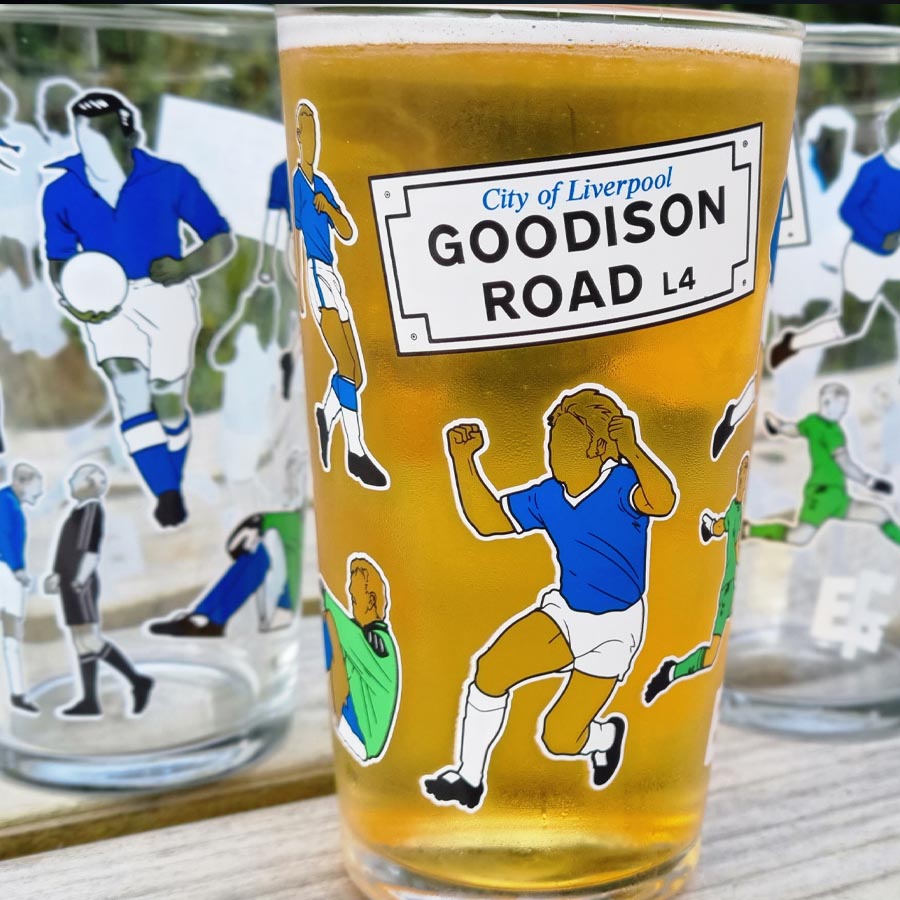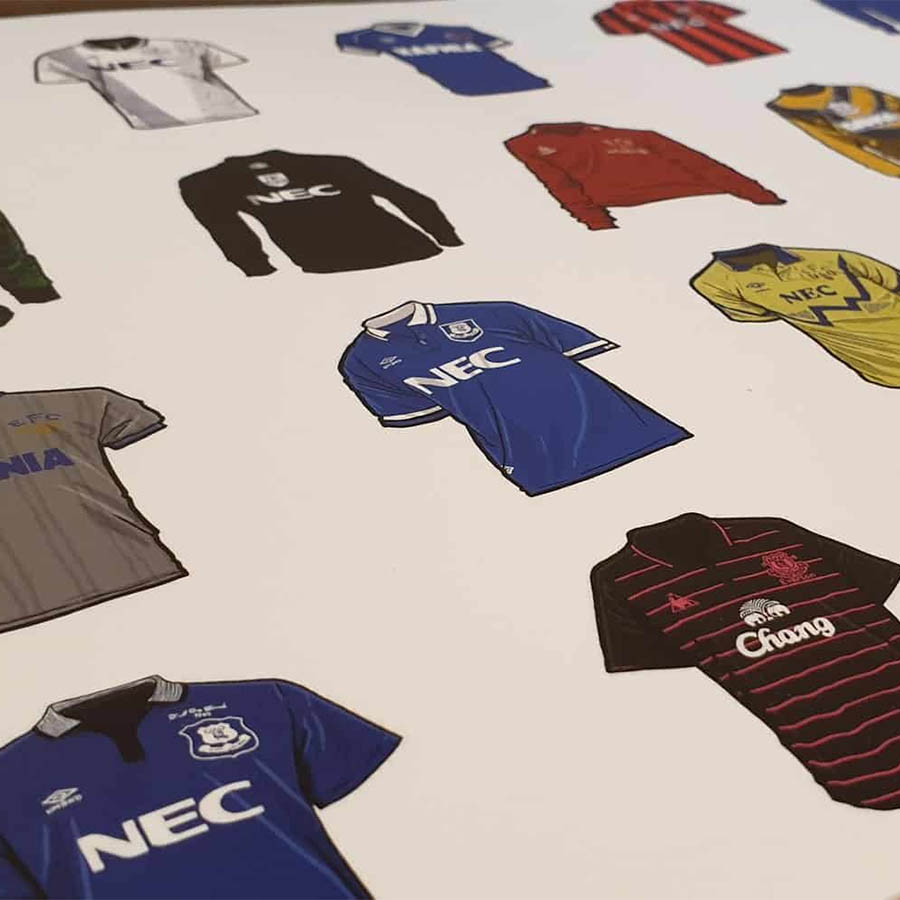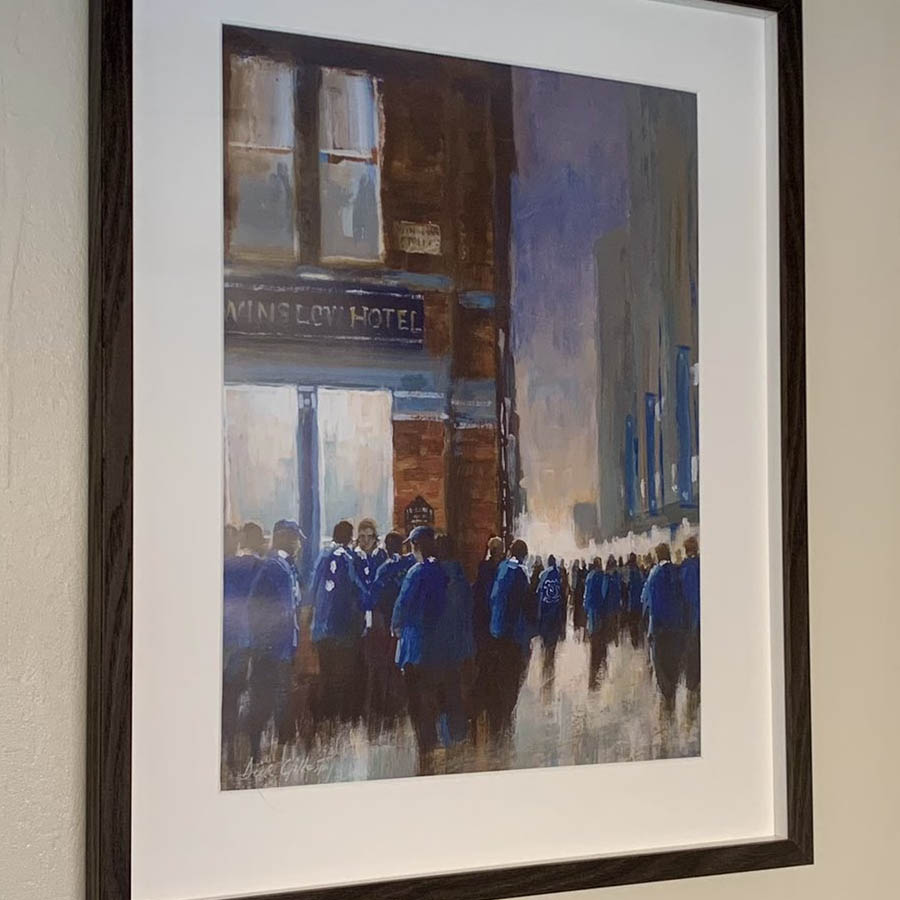https://www.joe.co.uk/sport/world-mental-health-day-how-everton-fc-saved-the-life-of/91032
World Mental Health Day: The story of how Everton FC saved my life
When Colin Dolan's partner came up with a suggestion of one way that he could manage the mental health issues that have affected him throughout his adult life he was initially reluctant to act upon it.
The suggestion was for him to get involved in a local programme built around football which, given his love for the game, made a lot of sense.
But there was one problem: Colin, who has bipolar disorder, is a Liverpool fan. Accepting he needed help had been hard enough for him without going to his own club's great rivals in search of it.
Thankfully, he put his own prejudices to one side and took a decision that he believes has saved him from suicide.
“If it wasn't for Everton In The Community, I wouldn't be here,” he says. “I wouldn't have survived another episode, it's that simple. I've been depressed at times since I started the programme and I expect it will happen to me again but I can cope with it now because of the football and it all goes back to my partner encouraging me to get involved.
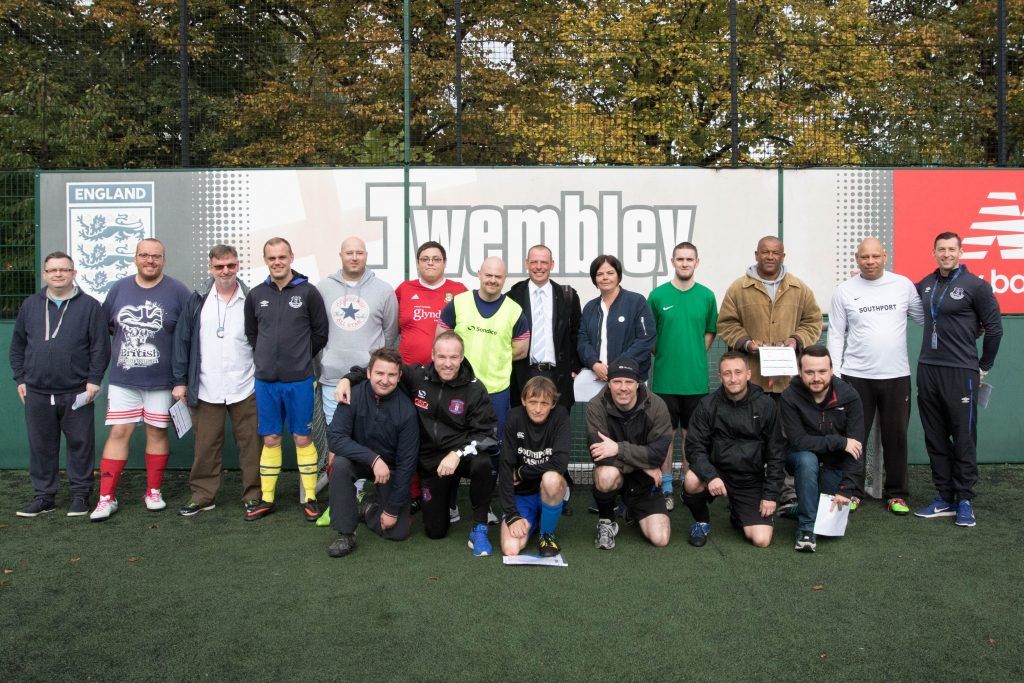
“I was 47 at the time and my immediate reaction was that I was past it, my next one was that I certainly didn't want to go to Everton!
"I'm originally from Glasgow and I'm a Celtic man but Liverpool have always been my English team and I'll be perfectly honest, when she offered me the chance to go to Everton my first thought was to go and find out whether Liverpool had something like that because I'd rather go there.
“But they didn't offer the same service so I went to Everton and the connection was just instant. The first time I kicked a ball, the first time I shouted for a pass, the first time I won a tackle, I was getting that buzz that football brings.
"All of those nasty, dark feelings were gone instantly. I was having a good laugh with the lads and after I left I could still feel the buzz.
“I'd keep going back to make sure it was topped up; it's like medication in that way in that it wears off and you need to keep going back to it.
"Over a period of time, I realised that I was surrounded by my peers who had all gone through similar things to me and right away I thought 'This works, this is keeping me healthy.'”
The work of Everton In The Community (EITC) continues to win richly deserved plaudits as the club's willingness to connect with those that they share a city with or just a love of football with sets a standard for others to aspire to.
Yesterday, at a complex on the outskirts of Liverpool, Everton hosted the National Mental Health Football Championships, the annual showpiece event that uses football to bring together sufferers like Colin at a tournament that gives them a sporting outlet at the same time as raising awareness of mental illness.
Twenty teams from around the country were involved but the commitment of Everton, the first club in the country to have a mental health co-ordinator, a role filled by Jonathan Garside, extends well beyond participating in world mental health day.
Along with Mersey Care NHS Trust, they run a year-round programme called Imagine Your Goals which is aimed at sufferers of all types of mental illness. They are also one of sixty organisations nationwide which has signed up to Time To Change, an initiative designed to tackle mental health discrimination and stigma in the workplace.
“From a community point of view, we were really passionate about this area of work from the outset,” Garside explains. “Going back to 2007 when the programme first started it was identified that there was no real infrastructure in terms of funding, expertise and staff so it was a bit of an organic process and it has developed from there and now the work that we pioneered has been rolled out to 15 clubs throughout the country.
“At the outset what we wanted to do was make a local difference. There was a lack of provision in that football wasn't being used in this therapeutic way. We wanted to benefit as many people as possible and we now have training sessions taking place every day of the week at various locations throughout the city. Key to that has been making them local and accessible and at a time that is appropriate.”
Timing turned out to be arguably the most complex issue that EITC has faced but after a period of trial and error it has now been resolved.
“We learned quite early on that if we designed the programme independent of the feedback of the participants that we were hoping to serve, the likelihood was that we would get it wrong,” Garside admits.
“We started putting sessions on at 9 o'clock and 10 o'clock in the morning and we were wondering why no one was coming even though we'd had great expressions of interest.
“We had to go back to the drawing board and back to the people that we were serving to find out why they hadn't been coming and it turned out that it was a lot to do with the medication that they were having. If you are on medication and it's keeping you up late at night a mid-morning session isn't going to be ideal for you.
"Ultimately, after having that conversation, we listened, adapted appropriately and suddenly there was this massive influx of people. That was a real penny dropping moment for us.”
Working alongside Garside, Matthew Byrne of Mersey Care Mental Health Foundation Trust has helped the programme grow from humble beginnings but everyone involved in the initiative has never lost sight of the original ideal that it should be as inclusive as possible.
“We started off with six hubs throughout Merseyside and at the outset we offered two hour training session,” Byrne recalls.
“One of the main concepts for us that while we wanted to build competition in, it was about inclusion and participation. There was no exclusion criteria. Anyone who turned up participated.
"From that point it was about word getting out and service users understanding that it wasn't something that wasn't only going to be on for a few weeks. We'd funded this for a full year and that was really important.
"We then funded again but this time we were able to introduce leagues when Everton asked if we could have some competition.
“The service users include people with depression, schizophrenia, anxiety, personality disorders and again there is no exclusion criteria. Obviously it all depends on your level of recovery, if someone is in a crisis, for example, there's no point in getting involved at that stage.
"But when the time is right we have a partnership with Everton where we both work together to help when service users are at the right stage of their recovery when something like this can make a positive difference.
“It's about engaging people. It's not a medical model. It gives people the following – it gives them an activity, it creates an opportunity to make friends and develop relationships and through sport it improves health and creates a sense of well being.
"You get a sense of self-worth but you also get that joy of camaraderie that comes with being part of a team. It's not just a game of football.”
Another spin off has been the development of an early warning system which allows link workers to identify if any service users are showing signs of a deterioration in their condition. “But one of the biggest things for me,” Byrne continues, “is that we are seeing people smile and people enjoying themselves.”
There have also been achievements that go beyond enjoyment, although Garside maintains that honours will always be secondary to the pursuit of well being.
“The lads love their football and we've had some really great moments from that point of view,” he says. “We're current national and European champions, which is a feat in itself but they're just trophies at the end of the day, the most important thing is that we're helping people to better their own lives. We have quite a few success stories and each with their own merit.
“One recently was Derek who started with us in 2010. When he first came through the door he was really shy, timid and wouldn't make eye contact. It wasn't overnight but over the medium term he has blossomed to the point that he has achieved a number of qualifications that will improve his employability and also secured a full-time job with Everton.
"He has a long term girlfriend, he's moved into his own flat, he's just been capped by England and represented his country in Portugal recently. That's one story of many.
“Looking ahead, we've hosted the national championships for the last three years and who knows in the future maybe we could have some sort of Premier League.
"But whatever happens in the years to come, it is vital that we help to raise awareness and remove the stigma because we know that one in four people suffer from mental illness and they are just the ones who seek help, there are many more who suffer in silence.
"If Everton can help reach some of those who are most at risk because they are isolated that would obviously be a positive development.”
For Colin, the change that getting involved in EITC has made to his life is, in his own words, “bonkers,” particularly when he looks back to the days when he could see no alternative to suicide.
“I've suffered with depression, both lows and highs, for years, since my late teens,” he says. “I've had periods of my life when I've been suicidal, they were very dark and I had nowhere to go, no help whatsoever, and I thought I could do everything on my own. I got to a stage in my life where the illness got so bad that the only way to stop the pain that I was suffering and to escape the dark thoughts was to end my life.
“At the time when I was getting close to doing it I didn't think I had any other choice whatsoever. My first attempt was when I was 22.
"I went to hospital but thinking I was a big hard man I discharged myself the next day even though they asked me to go and see a psychiatrist because I was feeling suicidal.
"The number of times in my life I've had periods like that? It's probably in the high teens. Some of the periods have only lasted a month but others have lasted for eight or nine months and some have been so severe that I've gone down the road towards suicide.
“The big one was going back six or seven years, I ended up in a coma and on a life support machine after taking an overdose.
"Coming through that wasn't even a wake up call; I still reverted to my old ways of trying to cope with the good and bad times by abusing alcohol and cocaine. I was going from job to job and couldn't settle.
"I had this persona about me that projected something that I wasn't. I was thinking that I was a big man, that I was someone special and I had to play up to that so no-one could see the real me.”
If a spell in a mental hospital in Madrid was his first turning point, swallowing his parochial pride and seeing what Everton had to offer was, in his opinion, the most crucial one. “I haven't looked back since,” he adds.
“My journey has gone from joining the programme at Everton In The Community, becoming a volunteer and going on to launch my own football association to bring everyone together from different parts of the country.
“I started networking three years ago and there are now 30-40 new programmes around the UK that I have had some sort of input into. I'm not saying I started them, I've encouraged them and what I do now is I try to get more support from the NHS.
"The relationship that we have between Everton and Merseycare, I want that repeated all over the country. It doesn't happen as much as people might think it does, there are only a few local NHS organisations who support it. The Mental Health Football Association is responsible for the networking.”
But what is it about football and his experience with Everton in particular that Colin believes has saved him?
“It's the experience of the competitive edge, it's making new friends, it's walking away with a sense of pride,” he says. “The lads who are playing at the tournament today will take all of these things from it and that gives them a sense of emotional well being.
"When you're playing football you're not thinking of anything else and on top of that you have the social element. Lads will walk away from here with smiles on their faces and they'll wake up tomorrow still feeling that buzz. As Matthew says, it's so much more than a game of football.”
If you ever need to talk about your mental health, here's a list of the resources available to all of us.

